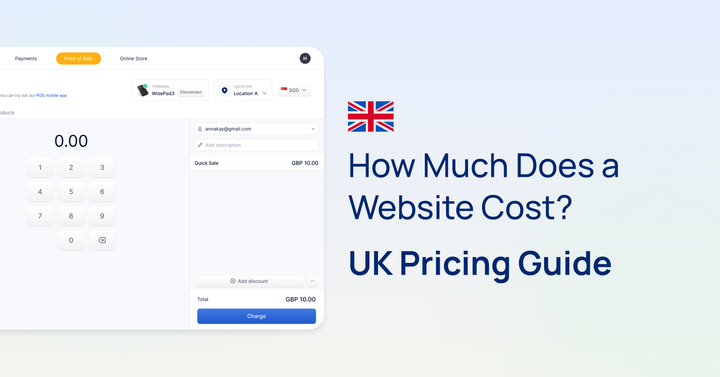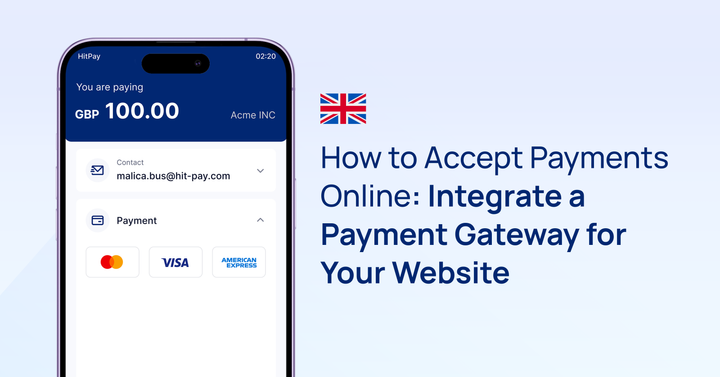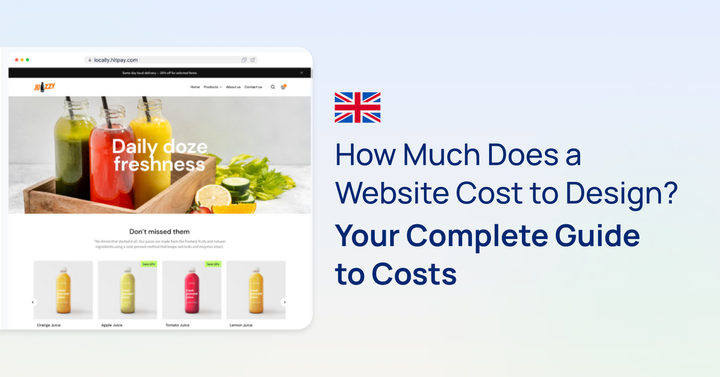How Much Does a Website Cost? Guide to Monthly Website Costs
This guide explores the monthly costs involved in building and maintaining a website, covering domain registration, hosting, design, and maintenance expenses to help businesses effectively budget for their online presence.
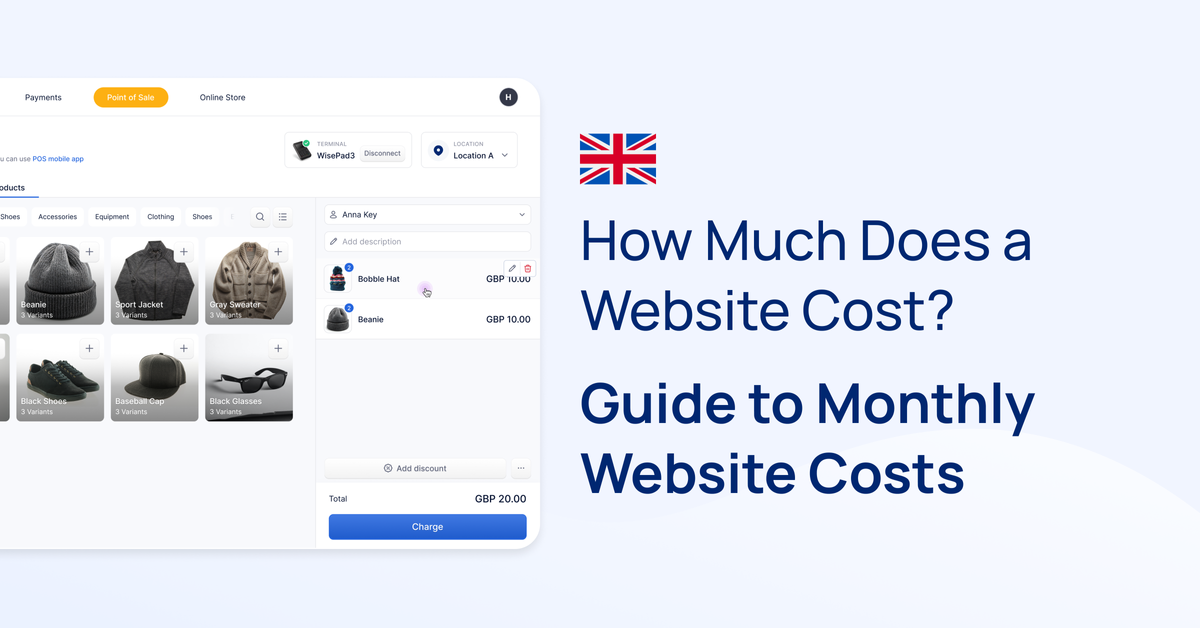
For small and medium sized businesses, understanding the cost of building a website is crucial. Whether you're creating a simple informational page or a full-fledged online store, expenses can vary widely depending on factors like domain registration, hosting, design, and ongoing maintenance. Knowing these costs upfront can help you plan your budget effectively and avoid surprises later on.
In this article, we'll break down the different costs associated with building a website, from initial setup to ongoing expenses, so you can make informed decisions for your business.
Additionally, we’ll show you how HitPay's all-in-one online store builder can simplify the process by providing an easy-to-use platform that integrates seamlessly with your website, allowing you to manage your online store, track inventory, and accept payments without hassle.
Key Takeaways
- Monthly website costs include domain, hosting, design, and maintenance.
- Knowing the cost of building a website helps avoid hidden fees.
- The complexity of your site affects ongoing costs.
- Your choice of hosting and service provider changes your monthly costs.
- Planning your budget is key for keeping your website running smoothly.
How Much Does It Cost to Build a Website?

As of 2024, there are over 1.09 billion websites online, and the cost to build one can vary widely depending on several factors. The overall price depends on whether you choose a budget-friendly website builder or opt for a custom-built site developed by a professional. Each approach offers different advantages and cost implications.
Average Costs: What to Expect When Building a Website
The cost of building a website largely depends on its complexity and design. Basic websites with standard features can be relatively inexpensive, especially if you use a website builder. However, more advanced sites with custom themes, plugins, e-commerce functionality, and unique graphic designs can significantly increase the cost.
Here’s a breakdown of potential costs:
- Basic Website (DIY with a website builder): $0 to $500 annually (including hosting, domain, and basic features).
- Custom Website (Designed by a professional): $2,000 to $10,000 or more, depending on complexity, functionality, and ongoing maintenance.
It’s crucial to clearly define your business needs and prioritise essential features to avoid overspending. Extras like advanced SEO tools, premium themes, or bespoke graphic designs can drive up the total cost, so plan accordingly.
Key Considerations When Building a Website: Features, Design, and Budget
Several factors influence the overall cost of building a good website, and understanding these can help you make informed decisions:
- Platform Choice: Your platform will dictate much of the cost. Using a content management system (CMS) like WordPress or a website builder like HitPay, Wix or Squarespace is generally more affordable. However, a fully custom-built site designed by a web developer will come with a higher price tag.
- Design and User Experience: A professional, visually appealing design is key to creating a strong brand presence online. While using pre-made themes can keep costs low, custom designs tailored to your brand’s identity will require more investment. Ensure your website provides an intuitive and engaging user experience, particularly if you need custom features like e-commerce integration or interactive elements.
- Website Features: The more advanced the functionality, the higher the cost. Features such as e-commerce capabilities, SEO optimization, content management systems, and mobile responsiveness are critical to consider. Determine which features are non-negotiable for your business to balance functionality with your budget.
- Ongoing Costs: Building a website isn’t a one-time expense. Consider ongoing costs such as domain registration, hosting, updates, maintenance, and any third-party services required. Planning for these expenses will help you manage your long-term budget.
Key Factors That Influence the Cost of A Business Website Per Month

When figuring out what your website costs each month, many factors come into play. It's key to understand what goes into this in order to budget well. This way, you're ready for both regular and unexpected costs.
1. Website Hosting Costs
Website hosting can take up a large chunk of your monthly bills. Prices can range widely based on how many visitors your site gets. If your site is very popular, you might need more expensive hosting. It's important to choose a hosting plan that matches your website's needs to ensure fast load times and reliable performance.
2. Domain Renewal Fees
Don't forget about domain renewal fees in your budget. These fees can vary depending on the domain and registrar. Knowing when your domain needs renewal helps avoid losing it. Regularly monitoring your domain status ensures that your website stays active and accessible to visitors.
3. Maintenance and Support Fees
How much you pay for website maintenance depends on your site's complexity and the services you need. Basic support can start at a relatively low cost, but more advanced services can cost a lot more. Keeping your site updated and bug-free is crucial for its performance and relevance.
4. Content Updates and Management Fees
Outsourcing content updates will add to your costs. Adding new content regularly keeps visitors coming back and helps with search engine rankings.
The cost will vary based on how often you update and the provider's rates. Consistent, high-quality content also establishes your authority in your industry, which can drive more organic traffic to your site.
5. Security and SSL Certificate Costs
Security is essential for any website, and SSL certificates play a key role in protecting user data. While some SSL certificates are available for free, others may come at a higher cost.
Regular maintenance also helps protect your site from security threats — especially since over 80% of data breaches are due to poor password security — and ensures compatibility with the latest technologies.
A reliable SSL certificate not only safeguards your site from security threats but also helps build trust with your visitors. Regularly reviewing and updating your website's security measures is critical to preventing data breaches and maintaining user confidence.
By considering these factors, you can plan your monthly expenses more effectively, ensuring your website operates smoothly and securely while keeping your audience engaged.
Website Hosting Costs: A Detailed Breakdown
When planning your website budget,it's important to understand the various hosting costs, as these are a significant part of your monthly expenses. The hosting plan you choose greatly impacts your website's performance. There are several hosting options available, each catering to different needs and budgets.
Shared hosting is the most economical choice for startups or personal websites. It allows multiple websites to share server resources, making it ideal for smaller sites but potentially slowing down during high-traffic periods.
For websites expecting more visitors or needing better performance, VPS or dedicated hosting might be more suitable. VPS hosting offers a balance between cost and performance, providing more resources and control than shared hosting.
Dedicated hosting is designed for websites that require all server resources, making it an excellent choice for larger businesses or high-traffic sites that demand fast loading times and robust performance.
Exploring the different hosting options can help you understand their key differences:
- Shared Hosting: Best for small websites and personal blogs.
- VPS Hosting: Ideal for growing websites and online stores.
- Dedicated Hosting: Suited for high-traffic websites and businesses with specific needs.
Choosing a reliable hosting provider is crucial for your website's success. Opting for lower-tier hosting can lead to issues during periods of heavy traffic, potentially making your site inaccessible. It's important to consider your site's specific needs carefully before deciding on a hosting plan.
Domain and SSL Certificate Costs: Additional Costs
When planning your website's budget, it's important to consider domain and SSL certificate costs. With over 367.3 million domain name registrations worldwide, finding a unique and available domain name can be competitive, and prices can vary depending on its popularity and availability. Some website builders may cover this cost upfront, but remember to budget for annual renewal fees.
SSL certificates are essential for secure e-commerce sites, protecting transactions and building trust with your visitors. The cost of SSL certificates varies widely; while some hosting providers offer basic options for free, advanced security certificates may come at a higher price.
Understanding these monthly costs helps with better financial planning for your online presence. Keep these points in mind to manage your budget well and keep your website secure.
Website Maintenance Costs: Total Cost and Additional Expenses
Understanding the costs of maintaining a website is crucial for effective budgeting. Maintenance expenses can vary significantly depending on your website's complexity. As your site grows and gains more features and traffic, costs for security, plugin updates, and content management will likely increase.
Regular updates to plugins and themes are essential to keep your site secure and functioning well; neglecting these can lead to costly security issues down the line.
Knowing the cost to keep a website running is key for good budgeting. The cost to maintain a website can change a lot, depending on how complex your site is.
- Basic website maintenance costs: £10 - £50/month
- Security measures: £50 - £200/month
- Plugin updates: £20 - £100/month
- Hiring a content manager: £150 - £1,200/month
These costs will vary based on the complexity of your website, required services, and market conditions. Additionally, hiring an SEO specialist or content manager will add to expenses, but their expertise is vital for keeping your website engaging, updated, and optimised for search engines.
With two-thirds of small businesses facing unexpected costs, it's essential to budget for both regular maintenance and unforeseen expenses, such as outdated components or security vulnerabilities, to keep your site secure and up-to-date.
Monthly Website Development Costs UK

When planning your website budget, it's important to consider your management options, as these choices can significantly impact your costs in the UK. Understanding the differences between managing the site yourself and hiring professionals will help you make an informed decision.
DIY vs. Professional Management Website Design Costs
Opting for a DIY approach may initially seem appealing due to its lower upfront cost — you can start with a basic website at a minimal monthly fee. However, unless using an easy-to-use, customizable option like HitPay, these services often offer limited support and require a substantial investment of your time for maintenance and updates.
You may find yourself handling tasks typically managed by a professional, which can become time-consuming and stressful. Alternatively, professional management involves higher upfront costs, such as around £4,000 for a custom design, along with ongoing maintenance fees.
Cost of Hiring a Web Developer vs. All-in-One Platforms
Hiring a web developer allows you to create a highly customised website tailored to your specific needs, but this approach can significantly impact your budget and may require ongoing expenses for updates and maintenance.
On the other hand, an all-in-one platform like HitPay offers a more cost-effective and straightforward solution with lower monthly fees. HitPay provides robust support and a comprehensive range of features specifically designed for small businesses, making it easy to manage your website, payments, and growth in one place.
With HitPay, you get everything you need to build and maintain a professional online presence without the high costs or complexity of a custom-built site.
Create A Website for Free Today With HitPay's Secure Website Builder
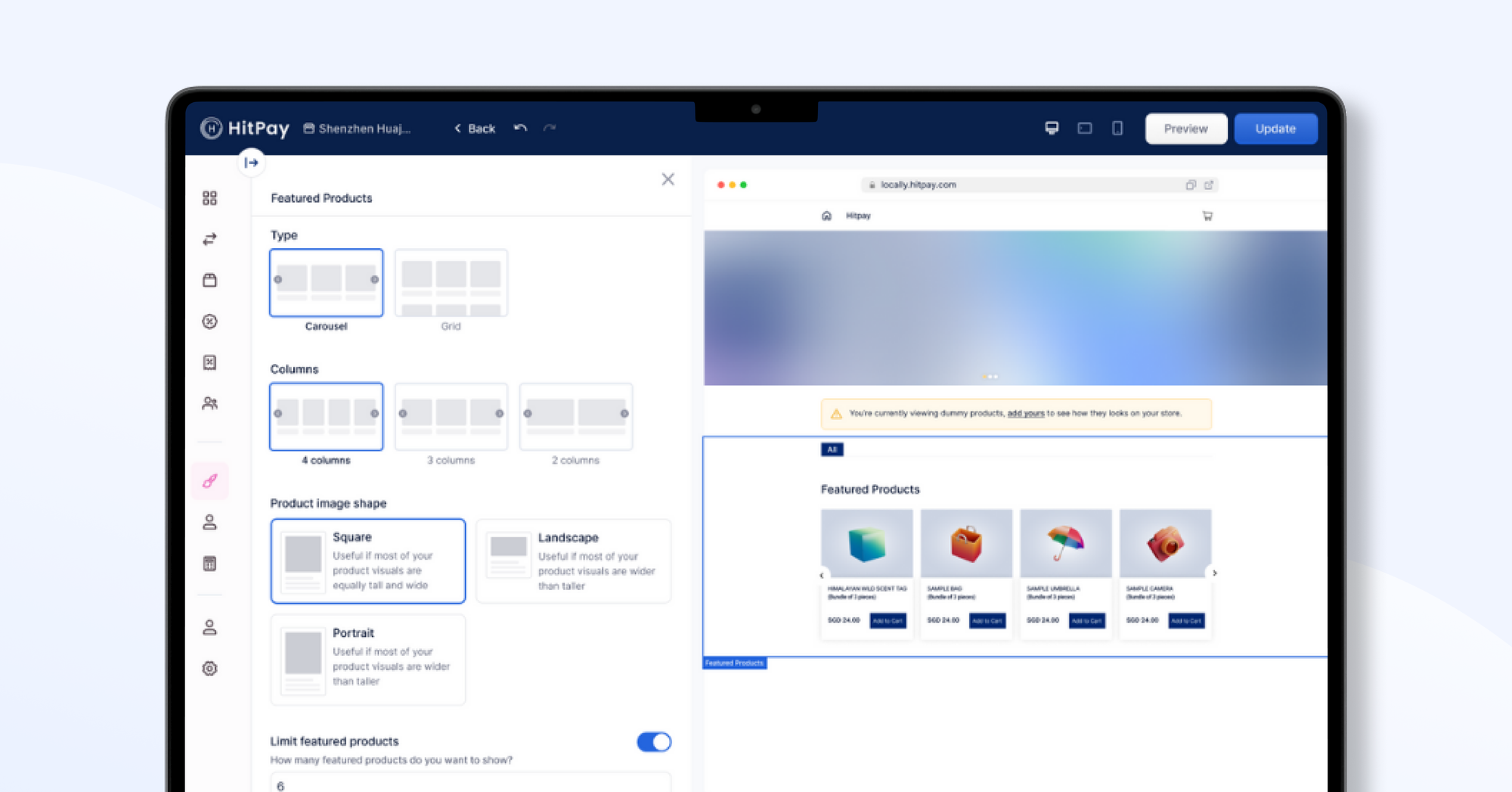
Understanding the costs of running a website is essential for business owners. Your website should not only look appealing but also function smoothly and remain secure. This requires careful consideration of design, hosting, and maintenance expenses, all of which can significantly impact your budget over time.
As you plan your website, explore all available options. Whether you choose a DIY approach or hire professionals, each comes with its own advantages and challenges. The key is to select a solution that aligns with your business goals and budget, ensuring the best fit for your needs.
It's also important to be aware of potential hidden costs and plan accordingly. Thoughtful budgeting and preparation will help you build a website that not only meets your current requirements but also remains robust and competitive in the ever-evolving online landscape.
Try HitPay’s Online Website Builder for free today!
If you're a customer who has questions about paying with HitPay, feel free to contact us on our website.
Website Cost FAQ
How much does a website cost per month?
The monthly cost for a website can vary a lot. It can start as low as £2.59 with a basic website builder. On the other hand, it can go up to £150 or more for advanced services and features.
What factors influence the monthly cost of a website?
Several things affect the cost of keeping a website up and running. These include website hosting, domain renewal fees, and maintenance and support. Also, costs for content updates and security measures like an SSL certificate are factors.
What are the ongoing website maintenance costs?
Maintenance costs can vary a lot. For basic sites, it can be around £10 to £50 a month. But for advanced features, it can be hundreds. This includes regular updates, security checks, and SEO management.
How do I keep my website running smoothly?
Keeping your website running well is key. This means doing regular security updates, performance checks, and refreshing content. Choosing reliable hosting is also crucial to avoid downtime.
What are the hidden costs associated with website management?
There can be hidden costs like extra plugin charges, custom themes, unexpected development costs, or higher hosting fees as traffic increases. Knowing all these costs helps with budgeting.

